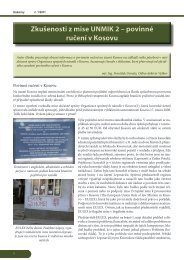TRADOC Pam 525-3-7-01 - TRADOC - U.S. Army
TRADOC Pam 525-3-7-01 - TRADOC - U.S. Army
TRADOC Pam 525-3-7-01 - TRADOC - U.S. Army
- No tags were found...
Create successful ePaper yourself
Turn your PDF publications into a flip-book with our unique Google optimized e-Paper software.
<strong>TRADOC</strong> <strong>Pam</strong> <strong>525</strong>-3-7-<strong>01</strong>Americans by other nations of the world. This is particularly evident in the most senior andvisible <strong>Army</strong> leaders who will continue to face extremely difficult situations in which their ownsense of right and wrong may be in conflict with those of their civilian leaders or national policy.Accordingly, moral and ethical development requires integrity—aligning individual andprofessional values beliefs and behaviors so they become internally consistent with the ethicalnorms of the profession. The <strong>Army</strong> assists this alignment now and in the future through focuseddevelopment programs throughout the lifecycle of the Soldier including concerted efforts topromote good judgment in morally ambiguous situations. This socialization process begins ininculcating a warrior spirit.3-2. Developing the Warrior SpiritGeneral George C. Marshall stated the following:True, physical weapons are indispensable, but in the final analysis, it is the humanspirit, the spiritual balance. . . that wins the victory. It is not enough to fight. . . Itis the spirit we bring to the fight that decides the issue. The Soldier’s heart, theSoldier’s spirit, the Soldier’s soul are everything. Unless the Soldier’s soulsustains him, he cannot be relied on and will fail himself, his commander, and hiscountry in the end. 57The warrior ethos alerts Soldiers to the hardest of all military truths—the mission is supreme.Fear will be ever present, but will never be an excuse for abandoning the mission. In likemanner, it is now a cardinal principal that a Soldier will never abandon a comrade. Both of thesetenets demand a moral choice by the Soldier to subordinate self even at the risk of death. Theoutcome of future combat will remain determined largely by the combatant possessing thesuperior will or spirit to win. For the U.S. <strong>Army</strong>, that spirit is reflected in the warrior ethos: Iwill always place the mission first, I will never accept defeat, I will never quit, I will never leavea fallen comrade.The Warrior Ethos serves as the foundation for the <strong>Army</strong>’s heritage and values and remainsan essential component of the Soldier’s character as written in FM 6-22:The Warrior Ethos is more than persevering in war. It fuels the fire to fightthrough any demanding conditions—no matter the time or effort required. It isone thing to make a snap decision to risk one’s life for a brief period. It is quiteanother to sustain the will to win when the situation looks hopeless and shows noindication of getting better, when being away from home and family is already aprofound hardship. . . . Pursuing victory over extended periods with multipledeployments requires this deep moral courage, one that focuses on the mission. . .Developed through discipline, commitment to the <strong>Army</strong> Values, and knowledge ofthe <strong>Army</strong>’s proud heritage, the Warrior Ethos makes clear that military service ismuch more than just another job. It is about the warrior’s total commitment. It isthe Soldiers’ absolute faith in themselves and their comrades. . . . The WarriorEthos forges victory from the chaos of battle. It fortifies all leaders and theirpeople to overcome fear, hunger, deprivation, and fatigue.55



